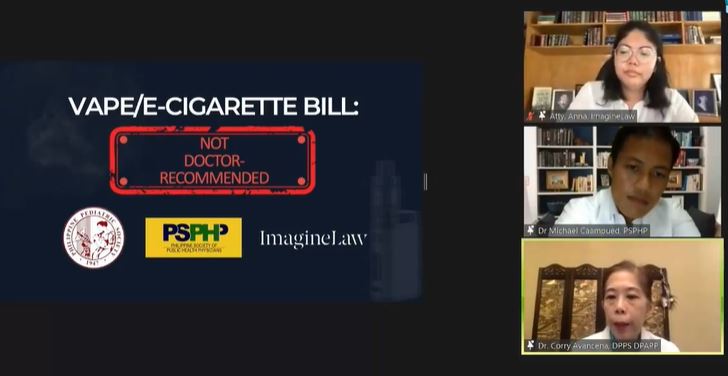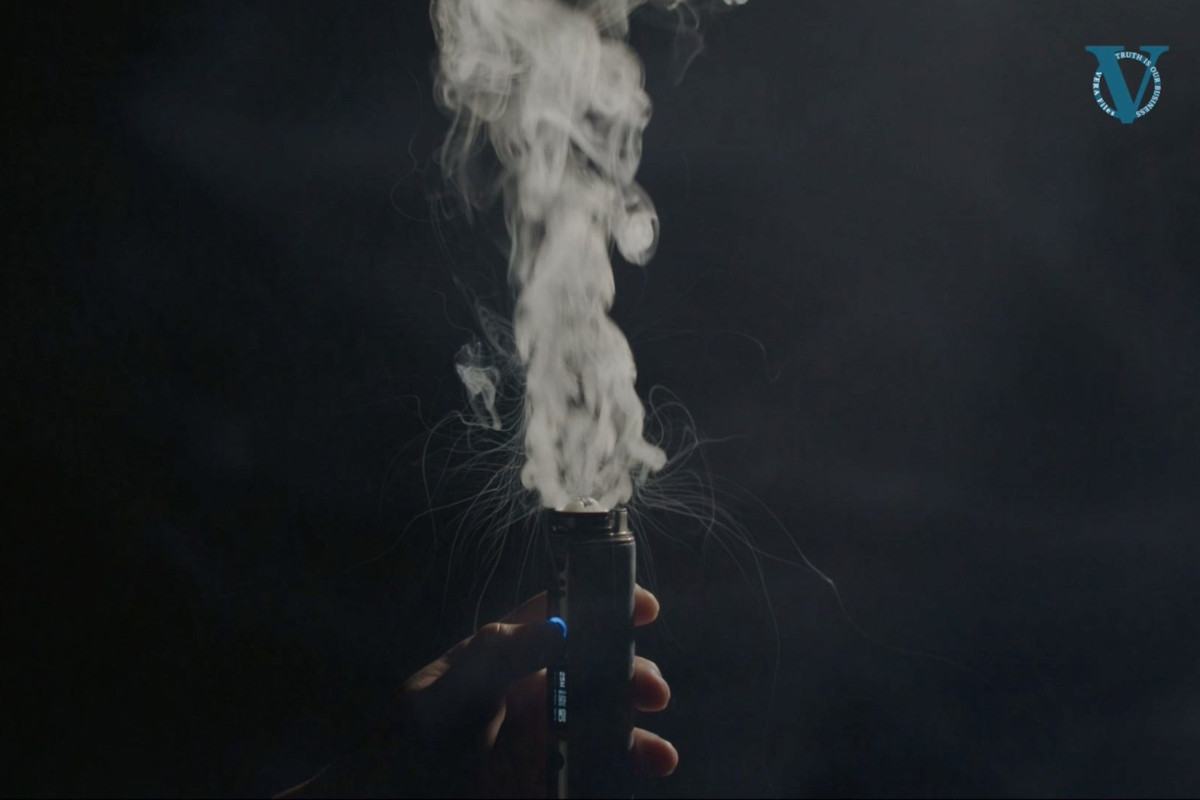
NOT DOCTOR-RECOMMENDED. Doctors Corry Avanceña, Michael Caampued and Atty. Anna Bueno discuss e-cigarettes and vaping risks, disapprove of the alleged safer alternatives. Screenshot taken during webinar organized by public interest law organization ImagineLaw.
Medical doctors on Monday renewed their call for a stop to the use of electronic cigarettes and heated tobacco products, which they say are not healthier alternatives to regular cigarettes, as the tobacco industry claims.
“Why would you replace one addiction with another addiction?” asked Dr. Corry Avanceña, a pediatric pulmonologist from the Philippine Pediatric Society, Inc., referring to the novel products which are being touted as safe transitions for those who want to quit smoking.
“Based on studies, consumers usually finish two pods a day. This is equivalent to 40 cigarettes, so where is the step down there?” she said during a forum on Monday, May 31, organized by public interest law organization ImagineLaw to mark World No Tobacco Day.
“Commit to quit, not to shift,” Avanceña said.
E-cigarettes or electronic cigarettes are battery-operated devices that contain nicotine and emit vaporized smoke which can be harmful to breathe in, even for exposed bystanders, according to the United States’ Center for Disease Control and Prevention.
The Department of Health (DOH) has cautioned that smoking and vaping can affect the immune system, making smokers less able to fight off infections, especially amid the pandemic where the novel coronavirus is easily transmissible through the nose and mouth.
Not safer, not less harmful
Dr. Michael Caampued, president of the Philippine Society of Public Health Physicians, said: “There is no high quality evidence that tells us that vaping is healthier than tobacco. So let’s not directly say that this is already safer.”
He said that while studies are still “limited” on whether these products are less harmful than traditional cigarettes, it has been proven that vaping or consuming e-cigarettes is addictive.
“Some studies say that many of these products, which claim to not have nicotine, have nicotine,” he said.
Avanceña said these are often added in minute amounts to the products.
Labeling these as safer alternatives can even open a “gateway” for more people to try the product and get addicted, the doctors said.
Tobacco control advocates have accused the tobacco industry of deception for marketing their novel products as being less harmful than regular cigarettes.
According to the 2015 Global Adult Tobacco Survey (GATS), 16.6 million adults are tobacco users.
This year’s observance of World No Tobacco Day comes just days after the House of Representatives approved on third and final reading House Bill 9007 or the proposed Non-Combustible Nicotine Delivery Systems Act.
HB 9007 aims to regulate the manufacture, importation, sale and promotion of electronic nicotine and heated tobacco products (HTPs) and sets the minimum age of people who can buy and use these products at 18 years old.
But lawmakers who opposed the measure said it contradicts health warnings put out by health authorities on these products and could only perpetuate the nicotine addiction in the country.
Move up, not down, in harm reduction policies
For one, the bill lowers the age of people who can access and use e-cigs and HTPs to 18 years, from 21, which is the legal age set under Executive Order (EO) 106 issued last year, amending a 2017 order that imposes requirements and limitations on the promotion of tobacco products.
“I think, supposedly, if you want to improve something, you have to move up. EO 106 is already good…But with (HB 9007), it is like moving down,” Avanceña said.
Caampued echoed the statement, saying the executive order has already been a milestone for taxation to shift behavior.
“Our fear here is that when the legal age is lowered, more members of the youth will be exposed, and will have access,” he said.
Avanceña said medical authorities wanted the age raised further, instead of setting it lower.
“Actually, what we wanted was 25 years old. The reason why we opted for that age is because the brain will still mature until 25 years old. When affected by nicotine due to nicotine and early vaping, the prefrontal cortex – the area responsible for your memory and moods memory – will be affected in its development,” she said.
Consuming e-cigarettes can also lead to a number of diseases and health complications.
“You can get mild cases, like throat irritation, and severe ones like cancer and stroke,” said Avanceña.
A disease called EVALI, also known as the e-cigarette or vaping product use-associated lung injury, is a lung illness linked to using e-cigarette and vapes.
This was first identified globally in August 2019. But the Philippines reported its first case, a 16-year-old girl, in Cebu City three months later. She admitted to using e-cigarettes for six months while concurrently consuming combustible cigarettes, according to the DOH.
“This illness can mimic other diseases. You may get a common cold or headache, but upon further assessment, you may have it (EVALI),”said Avanceña.
A new generation of smokers
The tobacco industry is setting its eyes on a new generation of smokers, said Atty. Anna Bueno of ImagineLaw.
“This is part of their strategy to target young people because they need new consumers. They’re looking for products to lure new consumers into addiction,” she said, adding that online sellers of these novel products are able to serve their young customers because age verification is not at all strict.
Bueno said many pro-vaping or e-cigarette groups on social media apps have no strong age verification. “They will say they won’t accept minors, but you can just click on the option that you are 21 and above to enter these online groups.”
For marketing apps, the e-cigarettes are being “sold in the same category” as candy because of their sweet flavors, she said, referring to vapes that come in different flavors.
While Grab Mart has a tab that asks you to verify if you are 21 and above, it does not even offer a “no” option.
“When FB groups are taken down, they shift to Viber,” added Bueno, but adds that even without social media, the “advertisements come to you.” Convenience stores can show advertisements of e-cigarettes and vapes via texts during promo periods, she said.
Meanwhile, many vaping influencers expand their follower reach on online video platform Tiktok, where they may not be aware of their followers’ ages.
“There is no safe space from the aggressive advertising and promotion strategies of e-cigarettes and vape companies,” said Bueno.
Just quit
Quitting is the best way to stop the addiction, said the doctors.
The DOH launched its 24-hour hotline Quitline, established by the Philippine Lung Center under the DOH and in partnership with the World Health Organization, to help smokers stop the addiction.
The operator, after getting the patient’s basic personal information, will then refer him or her to cessation clinics nearby.
Avanceña said these patients can also get help from loved ones and close connections. For those who are not yet users and are curious in trying these products, they can also get help from close connections about its health risks.
“With teenages, they think the health risks are farther from now…Prevention is always better than treatment. Let’s not wait for more members of the youth (to get addicted),” she said.




